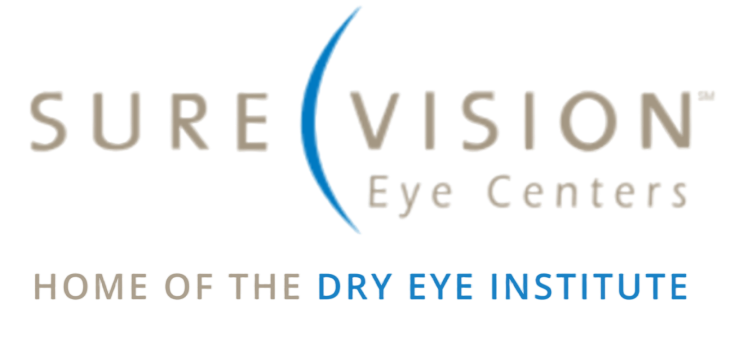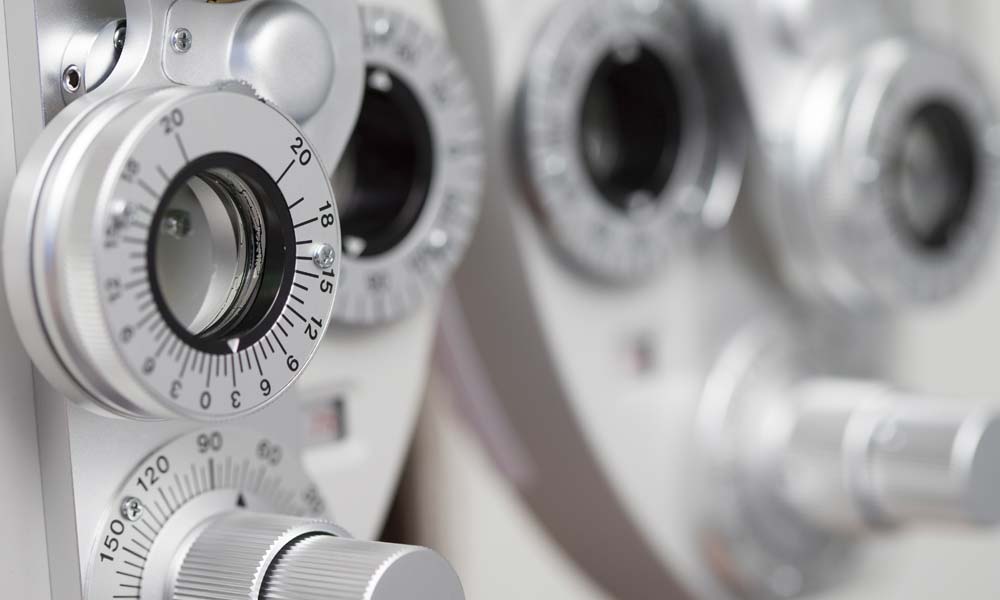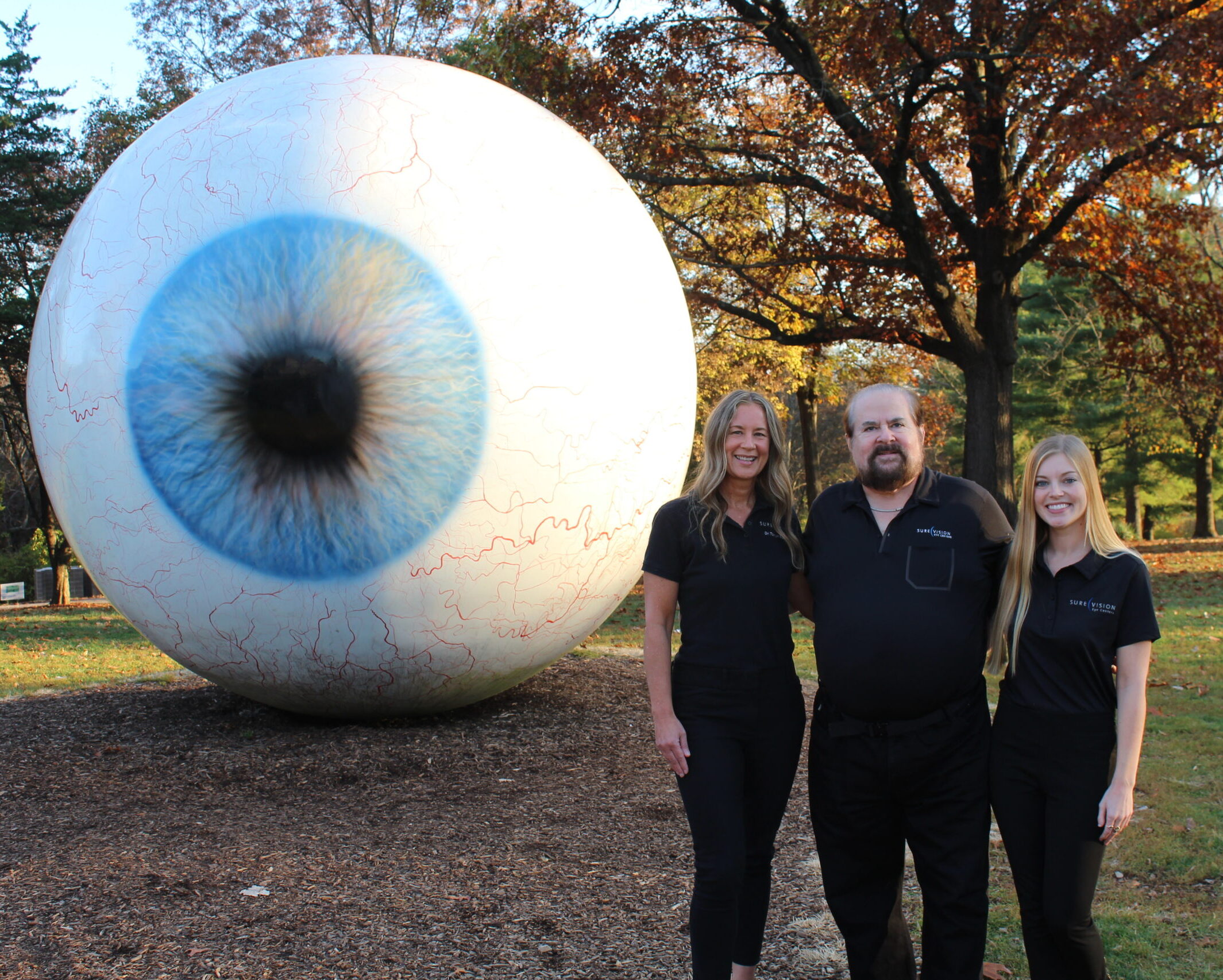Understanding Glaucoma
Glaucoma is a serious eye condition that can lead to permanent vision loss. It occurs when the pressure inside your eye becomes too high, damaging the optic nerve, the vital link that carries visual signals from your eye to your brain. Once this nerve becomes compromised, it cannot be repaired, which is why early detection and consistent monitoring are essential.
At SureVision Eye Centers, we are committed to protecting your vision. Every eye exam includes a thorough check of your eye pressure and a careful look at your optic nerve. If we notice signs that suggest elevated pressure or possible damage, we begin proactive steps to manage the condition before it impacts your eyesight.

Who Is at Risk for Glaucoma?
Although glaucoma can affect people of any age, it is most commonly diagnosed in adults over 60. However, younger individuals with certain risk factors should also be vigilant about their eye health. These include:
- High degrees of nearsightedness (myopia) or farsightedness (hyperopia)
- A family history of glaucoma/li>
- Prolonged use of steroid medications
- Pre-existing health conditions such as diabetes or sickle cell disease
If you fall into any of these categories, it’s important to have your eyes evaluated regularly. Many forms of glaucoma develop slowly and without noticeable symptoms, so routine screening is the best defense.
How Eye Pressure Affects Vision
Your eye naturally maintains its shape and function through a constant flow of fluid. This fluid is produced in the middle of the eye and exits through a specialized drainage system at the front. If the drainage system becomes clogged or begins to fail with age, pressure can build inside the eye.
In most cases, the normal eye pressure range falls between 11 and 21 mmHg. When that pressure rises and remains elevated, it begins to damage the optic nerve. Interestingly, some people can experience optic nerve damage at pressures within the normal range, especially those with underlying health conditions or thinner corneal tissue. That’s why comprehensive eye exams are essential, even for individuals who do not feel any symptoms.
Recognizing Glaucoma Symptoms
One of the most dangerous aspects of glaucoma is how silently it progresses. The eye does not register the sensation of pressure, and the initial damage affects peripheral vision, which people may not notice right away. By the time glaucoma impacts central vision, the condition may have already advanced significantly.
In rare cases, a sudden increase in eye pressure can cause noticeable symptoms such as blurred or hazy vision, headaches, eye pain, and nausea. This is known as Acute Angle-Closure Glaucoma and requires immediate medical attention.
For the vast majority of patients, though, glaucoma offers no early warning signs. That’s why regular screenings at SureVision Eye Centers are so important for early detection.
Advanced Glaucoma Treatment Options
At SureVision Eye Centers, we offer a full spectrum of treatment options designed to control glaucoma and preserve your vision. Your treatment plan will be tailored to your individual needs, condition severity, and lifestyle.
Medicated Eye Drops
Many patients benefit from prescription eye drops that reduce the production of fluid or increase fluid drainage. These are often the first line of treatment and can be effective when used consistently.
SLT Laser (Selective Laser Trabeculoplasty)
This quick, non-invasive treatment is performed right in our office. SLT uses targeted laser energy to stimulate the eye’s natural drainage system, improving fluid outflow and lowering intraocular pressure. It is painless and can often reduce or eliminate the need for daily eye drops. The procedure can also be repeated as needed to maintain long-term pressure control.
ECP Laser (Endoscopic Cyclophotocoagulation)
ECP is typically performed in combination with cataract surgery. It takes less than a minute and helps reduce fluid production inside the eye. This procedure can significantly reduce or eliminate the need for glaucoma medications after surgery. Like SLT, it is covered by most health insurance plans.
Surgical Solutions
For advanced cases of glaucoma that do not respond to medications or laser treatment, surgical options are available. These procedures create a new drainage path for eye fluid, helping to lower pressure and protect the optic nerve from further damage. Our team will walk you through your options and help determine the most effective approach.
Frequently Asked Questions About Glaucoma
How often should I be screened for glaucoma?
If you are over the age of 60 or have risk factors such as a family history of glaucoma, diabetes, or high myopia, it’s recommended to have a comprehensive eye exam every year. For individuals between 40 and 60 without known risk factors, screening every two years is typically sufficient. These exams help detect changes in eye pressure or optic nerve health early, before symptoms appear. At SureVision Eye Centers, our doctors tailor screening frequency based on your risk profile to ensure long-term eye health.
Can glaucoma be cured?
Glaucoma is a chronic condition that cannot be cured, but it can be successfully managed. Early diagnosis and consistent treatment can significantly slow its progression and help preserve vision. Treatment options, including prescription eye drops, laser procedures, and surgery, aim to lower intraocular pressure and protect the optic nerve from further damage. Many patients live full lives with healthy vision by following their treatment plans closely and attending regular follow-up visits.
Is vision loss from glaucoma reversible?
Vision loss from glaucoma is permanent. Once the optic nerve fibers are damaged, they cannot regenerate. That’s why catching glaucoma early is so important. While we cannot restore lost vision, we can help stop additional damage. With the right care, most people with glaucoma can maintain stable vision for many years. Preventative care, early intervention, and consistent follow-up are the most effective tools for avoiding vision loss.
Are laser treatments painful?
No, laser treatments such as SLT (Selective Laser Trabeculoplasty) and ECP (Endoscopic Cyclophotocoagulation) are typically quick and painless. SLT is performed in-office, requires no incisions, and most patients report minimal discomfort, often described as a brief stinging sensation. ECP is done during cataract surgery and adds only a few seconds to the procedure. These advanced treatments offer a convenient and effective way to lower eye pressure, often reducing or eliminating the need for daily eye drops.
Does glaucoma always lead to blindness?
Glaucoma does not have to result in blindness. In fact, with proper medical management, most people diagnosed with glaucoma retain good vision throughout their lives. The key is early detection and staying committed to treatment. That includes regular check-ups, taking prescribed medications as directed, and being alert to any changes in vision. At SureVision Eye Centers, we take a proactive approach to glaucoma care, focusing on long-term vision protection through personalized treatment plans and continuous monitoring.
Is glaucoma hereditary?
Yes, glaucoma can run in families. If you have a parent, sibling, or grandparent diagnosed with glaucoma, your risk of developing it is higher. Genetic factors can affect how your eyes regulate pressure or how your optic nerve responds to changes in pressure. Let your eye doctor know about any family history so that screening and monitoring can be started early.
Can lifestyle changes help manage glaucoma?
While lifestyle changes cannot replace medical treatment, certain habits can support overall eye health. These include maintaining a healthy blood pressure, exercising regularly, eating a diet rich in leafy greens and antioxidants, and avoiding smoking. It’s also important to follow your medication regimen closely and keep your appointments. If you are unsure about how your daily habits may impact your glaucoma, your SureVision provider can help guide you.
Protecting Vision for a Lifetime
The glaucoma specialists at SureVision Eye Centers serve patients throughout Greater St. Louis with a dedication to preserving vision through expert care and advanced treatment options. Our ophthalmologists are among the most experienced in the region, performing thousands of procedures each year and using the latest diagnostic and therapeutic tools.
If you’re due for an eye exam or have concerns about glaucoma, don’t wait. Schedule a consultation with SureVision Eye Centers and take the next step in protecting your vision.



